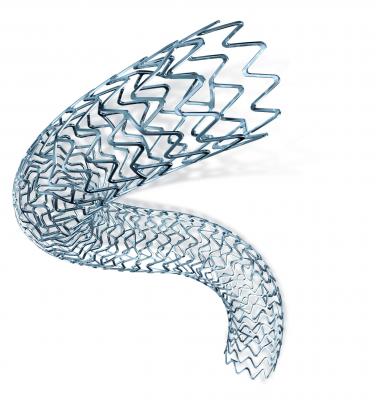
May 22, 2015 — Boston Scientific reported positive, long-term data from the EVOLVE Trial of the Synergy everolimus-eluting bioabsorbable polymer platinum chromium coronary stent system, with no new major adverse cardiac events reported between years three and four. The study results were presented at EuroPCR 2015 by Prof. Ian Meredith, director of MonashHeart, at Monash Medical Centre in Melbourne, Australia.
Findings from year four of the EVOLVE Trial include the following key performance measures:
- The target lesion revascularization (TLR) rate was 1.1 percent compared to 6.1 percent for the Promus Element Plus Stent System (p=0.07); and
- No definite or probable stent thrombosis (ST) was observed.
"These long-term data from the EVOLVE Trial are quite important as they highlight the sustained safety and performance of the Synergy Stent," said Meredith. "We continue to be encouraged by the consistently positive clinical data that point to the potential for improved healing with the Synergy Stent compared to durable polymer drug-eluting stents."
The EVOLVE Trial is the first human use, prospective, randomized, single-blind study evaluating the non-inferiority of the Synergy Stent, which employs an ultrathin bioabsorbable polymer coating applied to the abluminal (outer) surface of the stent. The comparator, the Boston Scientific Promus Element Plus Stent System, utilizes a durable polymer coating applied to the entire stent (inner and outer) surface. EVOLVE is the first in a continuing cadence of clinical trials evaluating the performance of the Synergy Stent in a range of patients.
In addition to these long-term data from the EVOLVE Trial, one-year findings from the EVOLVE II pivotal trial of 466 patients with diabetes treated with the Synergy Stent were presented by Stephan Windecker M.D., chief of cardiology and head of invasive cardiology at the Swiss Cardiovascular Center in Bern, Switzerland. Patients with diabetes face an increased risk of heart disease, stroke and myocardial infarction. The data presented for patients with diabetes include the following:
- The TLR rate was 4.4 percent; and
- Definite/probable ST was 1.1 percent at one year, with no definite/probable ST events after the first week post percutaneous coronary intervention (PCI).
The EVOLVE II Trial includes a global, multi-center, randomized, single-blind, non-inferiority pivotal trial designed to evaluate the safety and performance of the SYNERGY Stent System compared to the Promus Element Plus Stent System. The trial enrolled 1,684 patients in 125 sites worldwide and is part of a rigorous clinical program designed to support the submission for U.S. Food and Drug Administration (FDA) and Japanese Ministry of Health, Labor and Welfare (MHLW) approval of the Synergy Stent.
The EVOLVE II Trial also includes a non-randomized, single-arm diabetes study. The EVOLVE II Diabetes Substudy pooled patients with diabetes randomized to the Synergy arm in the EVOLVE II pivotal trial with patients enrolled in the non-randomized single-arm diabetes study as pre-specified in the study protocol.
Patients in the EVOLVE II Trial demonstrated clinical and angiographic complexity to a degree not observed in prior U.S. pivotal trials for drug-eluting stents (DES). More than 25 percent of patients had non-ST elevation myocardial infarction (NSTEMI) and approximately 75 percent of patients had AHA/ACC class B2/C coronary lesions. As previously reported, EVOLVE II met its primary endpoint, demonstrating non-inferiority of Synergy versus the Promus Element Plus Stent for 12-month target lesion failure in the overall patient population.
For more information: www.bostonscientific.com


 January 05, 2026
January 05, 2026 









